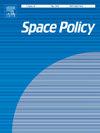火星多样性:火星上多元化社区的政府
IF 1.9
4区 社会学
Q2 INTERNATIONAL RELATIONS
引用次数: 0
摘要
未来的火星社会需要一个政府来处理社会问题,比如解决冲突、安全和资源分配。此外,由于很难找到愿意和有能力搬到火星的候选者,任务将需要在全球范围内寻找候选者。这篇文章考虑了一个多元化的火星人口,考虑到火星上严峻的生活条件,如何需要一种修正的自由主义形式,在这种自由主义中,火星人口的个人价值观指导公共政策,同时限制它。我认为,自由主义的特点与实际的局限性相结合,两者都受到不同人群世界观共同的道德价值观的影响,为平衡个人免受滥用的保护,同时确保采取必要的行动来确保社区的生存,提供了一个有利的媒介。利用共同的道德价值观来告知多样化社会的自由和限制,将有助于减少成功合作的障碍,并最终提高社区在火星上生存的机会。提出了一种在多样化社会中提取个人价值观的实用方法,并讨论了如何实施这些价值观以保证和限制火星社会中的个人自由。本文章由计算机程序翻译,如有差异,请以英文原文为准。
Martian diversity: A government for pluralistic communities on Mars
A government will be necessary to handle society-wide issues in the future Martian society, such as conflict resolution, security, and the distribution of resources. Additionally, because of the difficulty in sourcing willing and able candidates to move to Mars, missions will need to be an international effort with candidates sourced globally. This article considers how a pluralistic Martian population, taken with the severe living conditions on Mars, requires a form of modified liberalism in which the personal values of the Martian population guide public policy while simultaneously limiting it. I suggest that the traits of liberalism coupled with practical limitations, both informed by the moral values common to the worldviews of the diverse population, offer a favorable medium for balancing individual protections from abuse while ensuring that necessary actions can be taken to secure community survival. Utilizing common moral values to inform both the liberties and limitations of the diverse society will help mitigate barriers to successful cooperation and ultimately heighten the chances of community survival on Mars. A practical approach to extracting the values of individuals in a diverse society is presented, and how these values might be implemented to guarantee and limit individual freedoms in a Martian society is discussed.
求助全文
通过发布文献求助,成功后即可免费获取论文全文。
去求助
来源期刊

Space Policy
Multiple-
CiteScore
3.40
自引率
36.40%
发文量
40
期刊介绍:
Space Policy is an international, interdisciplinary journal which draws on the fields of international relations, economics, history, aerospace studies, security studies, development studies, political science and ethics to provide discussion and analysis of space activities in their political, economic, industrial, legal, cultural and social contexts. Alongside full-length papers, which are subject to a double-blind peer review system, the journal publishes opinion pieces, case studies and short reports and, in so doing, it aims to provide a forum for the exchange of ideas and opinions and a means by which authors can alert policy makers and international organizations to their views. Space Policy is also a journal of record, reproducing, in whole or part, official documents such as treaties, space agency plans or government reports relevant to the space community. Views expressed in the journal are not necessarily those of the editors or members of the editorial board.
 求助内容:
求助内容: 应助结果提醒方式:
应助结果提醒方式:


